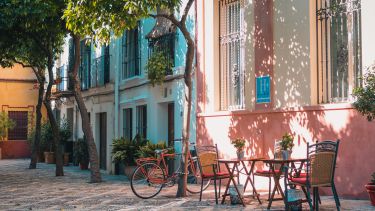Spanish Translation Competition 2023
We are delighted to announce the University of Sheffield Spanish Translation Competition for Year 12 and Year 13 students for 2023!

Thank you for your entries. This competition is now closed.
About the competition
Students of Spanish in Years 12 and 13 in the UK are invited to submit their translation of the original short Spanish text below. Only one translation per student is permitted.
About the Text
'Donde nadie te encuentre is based on the life of a historic figure, Teresa Pla Meseguer, nicknamed La Pastora, who was one of the most curious representatives of the post-war maquis movement in Spain. In her account of La Pastora’s life, [Alicia] Giménez Bartlett closely follows the extensive research offered by José Calvo in his definitive study of Agrupación Guerrillera de Levante y Aragón (AGLA), La Pastora. Del monte al mito (2009). In Giménez Bartlet’s novel, Teresa Pla Meseguer explores the liberating possibilities of the Civil War and of the post-war struggle of the Republican guerilla fighters against Franco’s dictatorship. Born intersex and assigned female gender at birth, La Pastora is doomed to spend her life trying to fit into a set of constrictive gender roles. The disruption of the stable modes of existence brought on by the Civil War allows Teresa to adopt a male identity and experience a way of life that would have been otherwise inaccessible to her. Yet living among the Republican guerrilla fighters soon turns out to be as restrictive as her existence in the Nationalist territory.'
From Olga Bezhanova, ‘Intersex, Monstrosity and the Civil War in Alicia Giménez Bartlett’s Donde nadie te encuentre’, Hispanófila, 170 (2014), 57-72 [57]
Text to Translate
From Alicia Giménez Bartlett, Donde nadie te encuentre (2011)
A los quince o dieciséis años ya tenía una fuerza como cinco hombres juntos, y no les exagero, pregunten por ahí. Nunca he sido gordo y entonces era una chiquita delgada y muy alta, como un palo. A veces había que cargarse una oveja de las grandes al hombro. Yo me cargaba de un solo golpe una oveja que llegaba a pesar medio cafís. Para que lo entiendan ustedes que son de fuera les explico que doce barcellas hacen un cafís y que cada barcella pesa doce o catorce kilos. O sea que me echaba encima una oveja viva de ochenta kilos. Primero la acostaba panza arriba, luego la cogía entre la barriga y las patas de atrás y ¡zas!, de un golpe para arriba, a la espalda. También había venido gente de otros mases para ver cómo lo hacía, porque muchos hombres jóvenes y no tan jóvenes siempre fallaban si lo intentaban y que lo hiciera una muchacha llamaba mucho la atención.
Tenía doce días libres al año, normalmente los domingos, un día libre cada mes. ¡Me gustaban tanto esos días! Me iba a ver otros ganados como les he dicho, corría por el campo, tallaba madera con una navajita, le hacía juguetes a Diego, que estaba loco por venirse conmigo, aunque yo siempre no me lo llevaba. Me tumbaba encima de la hierba si hacía sol y estaba en un monte bajo me lanzaba rodando hasta que llegaba al pie. Le pedía al del bar que me diera una lata de sardinas vacía y me la llevaba al monte, la ponía en una roca y jugaba a acertarle con piedras. Se me puso muy buena puntería haciendo eso.
(280 words)
The prize
The authors of the ten best entries will each receive a prize of a £25 Amazon voucher and an invitation to take part in a special Translation Workshop organized by the School of Languages and Cultures at the University of Sheffield, involving French academics, Masters students in Translation Studies and alumni who work in translation-related fields. The Workshop will be held online in January 2024.
The judges
The translations will be read and judged by a panel of Spanish experts from the School of Languages and Cultures at the University of Sheffield.
How to enter
The competition is open to students of Spanish in Years 12 and 13 in the UK. Please translate the text above by Alicia Giménez Bartlett. Translations should be the original work of individual students and should be uploaded via the Competition Entry Form. You must complete the form AND upload your entry via the link on the form or your entry may not be considered.
Winners will be notified by Wednesday 13 December 2023.
A fair copy of the translation, based on the best entries, will be available on this website in January 2024. Unfortunately, we cannot provide feedback on individual entries.
Buena suerte!
Dr Louise Johnson and Colleagues in Hispanic Studies

Visit us
Discover what sets Sheffield apart at our undergraduate open days on Saturday 21 June and Saturday 5 July 2025.
